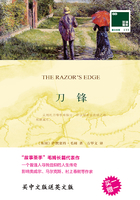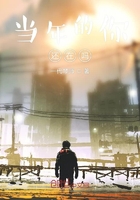The proprietor had just lighted a hanging oil lamp which gave off an unclean but friendly smell.He was a man of perhaps sixty, frail and bowed,with a long,benevolent nose,and mild eyes distort-ed by thick spectacles.His hair was almost white but his eyebrows were bushy and still black.His spectacles,his gentle,fussy move-ments,and the fact that he was wearing an aged jacket of black vel-vet,gave him a vague air of intellectuality,as though he had been some kind of literary man,or perhaps a musician.His voice was soft,as though faded,and his accent less debased than that of the maj ority of proles.
"I recognized you on the pavement,"he said immediately."You're the gentleman that bought the young lady's keepsake al-bum.That was a beautiful bit of paper,that was.Cream laid,it used to be called.There's been no paper like that made for—oh,I dare say fifty years."He peered at Winston over the top of his specta-cles."Is there anything special I can do for you? Or did you just want to look round?"
"I was passing,"said Winston vaguely."I just looked in.I don't want anything in particular."
"It's just as well,"said the other,"because I don't suppose I could have satisfied you."He made an apologetic gesture with his soft-palmed hand."You see how it is;an empty shop,you might say. Between you and me,the antique trade's just about finished.No de-mand any longer,and no stock either.Furniture,china,glass—it's all been broken up by degrees.And of course the metal stuff's mostly been melted down.I haven't seen a brass candlestick in years."
The tiny interior of the shop was in fact uncomfortably full, but there was almost nothing in it of the slightest value.The floor space was very restricted,because all round the walls were stacked innumerable dusty picture frames.In the window there were trays of nuts and bolts,worn-out chisels,penknives with broken blades, tarnished watches that did not even pretend to be in going order, and other miscellaneous rubbish.Only on a small table in the corner was there a litter of odds and ends—lacquered snuffboxes,agate brooches,and the like—which looked as though they might include something interesting.As Winston wandered toward the table his eye was caught by a round,smooth thing that gleamed softly in the lamplight,and he picked it up.
It was a heavy lump of glass,curved on one side,flat on the other,****** almost a hemisphere.There was a peculiar softness, as of rainwater,in both the color and the texture of the glass.At the heart of it,magnified by the curved surface,there was a strange, pink,convoluted obj ect that recalled a rose or a sea anemone.
"What is it?"said Winston,fascinated.
"That's coral,that is,"said the old man."It must have come from the Indian Ocean.They used to kind of embed it in the glass. That wasn't made less than a hundred years ago.More,by the look of it."
"It's a beautiful thing,"said Winston.
"It is a beautiful thing,"said the other appreciatively."But there's not many that'd say so nowadays."He coughed."Now,if it so happened that you wanted to buy it,that'd cost you four dollars. I can remember when a thing like that would have fetched eight pounds,and eight pounds was—well,I can't work it out,but it was a lot of money.But who cares about genuine antiques nowadays—even the few that's left?"
Winston immediately paid over the four dollars and slid the coveted thing into his pocket.What appealed to him about it was not so much its beauty as the air it seemed to possess of belonging to an age quite different from the present one.The soft,rainwatery glass was not like any glass that he had ever seen.The thing was doubly attractive because of its apparent uselessness,though he could guess that it must once have been intended as a paperweight.It was very heavy in his pocket,but fortunately it did not make much of a bulge.It was a queer thing,even a compromising thing,for a Party member to have in his possession.Anything old,and for that matter anything beautiful,was always vaguely suspect.The old man had grown noticeably more cheerful after receiving the four dollars. Winston realized that he would have accepted three or even two.
"There's another room upstairs that you might care to take a look at,"he said."There's not much in it.Just a few pieces.We'll do with a light if we're going upstairs."
He lit another lamp and,with bowed back,led the way slowly up the steep and worn stairs and along a tiny passage,into a room which did not give on the street but looked out on a cobbled yard and a forest of chimney pots.Winston noticed that the furniture was still arranged as though the room were meant to be lived in.There was a strip of carpet on the floor,a picture or two on the walls,and a deep,slatternly armchair drawn up to the fireplace.An old-fash-ioned glass clock with a twelve-hour face was ticking away on the mantelpiece.Under the window,and occupying nearly a quarter of the room,was an enormous bed with the mattress still on it.
"We lived here till my wife died,"said the old man half apolo-getically."I'm selling the furniture off by little and little.Now that's a beautiful mahogany bed,or at least it would be if you could get the bugs out of it.But I dare say you'd find it a little bit cum-bersome."
He was holding the lamp high up,so as to illumine the whole room,and in the warm dim light the place looked curiously inviting. The thought flitted through Winston's mind that it would probably be quite easy to rent the room for a few dollars a week,if he dared to take the risk.It was a wild,impossible notion,to be abandoned as soon as thought of;but the room had awakened in him a sort of nostalgia,a sort of ancestral memory.It seemed to him that he knew exactly what it felt like to sit in a room like this,in an armchair be-side an open fire with your feet in the fender and a kettle on the hob,utterly alone,utterly secure,with nobody watching you,no voice pursuing you,no sound except the singing of the kettle and the friendly ticking of the clock.
"There's no telescreen!"he could not help murmuring.
"Ah,"said the old man,"I never had one of those things.Too expensive.And I never seemed to feel the need of it,somehow.Now that's a nice gateleg table in the corner there.Though of course you'd have to put new hinges on it if you wanted to use the flaps."
There was a small bookcase in the other corner,and Winston had already gravitated towards it.It contained nothing but rubbish. The hunting-down and destruction of books had been done with the same thoroughness in the prole quarters as everywhere else.It was very unlikely that there existed anywhere in Oceania a copy of a book printed earlier than 1960.The old man,still carrying the lamp, was standing in front of a picture in a rosewood frame which hung on the other side of the fireplace,opposite the bed.
"Now,if you happen to be interested in old prints at all—"he began delicately.
Winston came across to examine the picture.It was a steel en-graving of an oval building with rectangular windows,and a small tower in front.There was a railing running round the building,and at the rear end there was what appeared to be a statue.Winston gazed at it for some moments.It seemed vaguely familiar,though he did not remember the statue.
"The frame's fixed to the wall,"said the old man,"but I could unscrew it for you,I dare say."
"I know that building,"said Winston finally."It's a ruin now. It's in the middle of the street outside the Palace of Justice."
"That's right.Outside the Law Courts.It was bombed in—oh, many years ago.It was a church at one time,St.Clement's Danes, its name was."He smiled apologetically,as though conscious of saying something slightly ridiculous,and added:"Oranges and lem-ons,say the bells of St.Clement's!"
"What's that?"said Winston.
"Oh—'Oranges and lemons,say the bells of St.Clement's.' That was a rhyme we had when I was a little boy.How it goes on I don't remember,but I do know it ended up,'Here comes a candle to light you to bed,Here comes a chopper to chop off your head.' It was a kind of a dance.They held out their arms for you to pass under,and when they came to 'Here comes a chopper to chop off your head' they brought their arms down and caught you.It was just names of churches.All the London churches were in it—all the principal ones,that is."
Winston wondered vaguely to what century the church be-longed.It was always difficult to determine the age of a London building.Anything large and impressive,if it was reasonably new in appearance,was automatically claimed as having been built since the Revolution,while anything that was obviously of earlier date was ascribed to some dim period called the Middle Ages.The centu-ries of capitalism were held to have produced nothing of any value. One could not learn history from architecture any more than one could learn it from books.Statues,inions,memorial stones,the names of streets—anything that might throw light upon the past had been systematically altered.
"I never knew it had been a church,"he said.
"There's a lot of them left,really,"said the old man,"though they've been put to other uses.Now,how did that rhyme go? Ah!I've got it!
'Oranges and lemons,say the bells of St.Clement's,
You owe me three farthings,say the bells of St.Martin's—' there,now that's as far as I can get.A farthing,that was a small copper coin,looked something like a cent."
"Where was St Martin's?"said Winston.
"St.Martin's? That's still standing.It's in Victory Square,a-longside the picture gallery.A building with a kind of a triangular porch and pillars in front,and a big flight of steps."
Winston knew the place well.It was a museum used for propa-ganda displays of various kinds—scale models of rocket bombs and Floating Fortresses,waxwork tableaux illustrating enemy atroci-ties,and the like.
"St.Martin's in the Fields it used to be called,"supplemented the old man,"though I don't recollect any fields anywhere in those parts."
Winston did not buy the picture.It would have been an even more incongruous possession than the glass paperweight,and im-possible to carry home,unless it were taken out of its frame.But he lingered for some minutes more,talking to the old man,whose name,he discovered,was not Weeks—as one might have gathered from the inion over the shop front—but Charrington.Mr. Charrington,it seemed,was a widower aged sixty-three and had in-habited this shop for thirty years.Throughout that time he had been intending to alter the name over the window,but had never quite got to the point of doing it.All the while that they were talking the half-remembered rhyme kept running through Winston's head:Or-anges and lemons, say the bells of St.Clement's,You owe me three farthings,say the bells of St.Martin's! It was curious,but when you said it to yourself you had the illusion of actually hearing bells,the bells of a lost London that still existed somewhere or oth-er,disguised and forgotten.From one ghostly steeple after another he seemed to hear them pealing forth.Yet so far as he could remem-ber he had never in real life heard church bells ringing.
He got away from Mr.Charrington and went down the stairs alone,so as not to let the old man see him reconnoitering the street before stepping out of the door.He had already made up his mind that after a suitable interval—a month,say—he would take the risk of visiting the shop again.It was perhaps not more dangerous than shirking an evening at the Centre.The serious piece of folly had been to come back here in the first place,after buying the diary and without knowing whether the proprietor of the shop could be trus-ted.However—!
Yes,he thought again,he would come back.He would buy fur-ther scraps of beautiful rubbish.He would buy the engraving of St. Clement's Danes,take it out of its frame,and carry it home con-cealed under the jacket of his overalls.He would drag the rest of that poem out of Mr.Charrington's memory.Even the lunatic pro-j ect of renting the room upstairs flashed momentarily through his mind again.For perhaps five seconds exaltation made him careless, and he stepped out onto the pavement without so much as a prelim-inary glance through the window.He had even started humming to an improvised tune—
Oranges and lemons,say the bells of St.Clement's,
You owe me three farthings,say the—
Suddenly his heart seemed to turn to ice and his bowels to wa-ter.A figure in blue overalls was coming down the pavement,not ten meters away.It was the girl from the Fiction Department,the girl with dark hair.The light was failing,but there was no difficulty in recognizing her.She looked him straight in the face,then walked quickly on as though she had not seen him.
For a few seconds Winston was too paralysed to move.Then he turned to the right and walked heavily away,not noticing for the moment that he was going in the wrong direction.At any rate,one question was settled.There was no doubting any longer that the girl was spying on him.She must have followed him here,because it was not credible that by pure chance she should have happened to be walking on the same evening up the same obscure back street,kilo-meters distant from any quarter where Party members lived.It was too great a coincidence.Whether she was really an agent of the Thought Police,or simply an ******* spy actuated by officious-ness,hardly mattered.It was enough that she was watching him. Probably she had seen him go into the pub as well.
It was an effort to walk.The lump of glass in his pocket banged against his thigh at each step,and he was half minded to take it out and throw it away.The worst thing was the pain in his belly.For a couple of minutes he had the feeling that he would die if he did not reach a lavatory soon.But there would be no public lavatories in a quarter like this.Then the spasm passed,leaving a dull ache behind.
The street was a blind alley.Winston halted,stood for several seconds wondering vaguely what to do,then turned round and be-gan to retrace his steps.As he turned it occurred to him that the girl had only passed him three minutes ago and that by running he could probably catch up with her.He could keep on her track till they were in some quiet place,and then smash her skull in with a cobblestone.The piece of glass in his pocket would be heavy enough for the job.But he abandoned the idea immediately,because even the thought of ****** any physical effort was unbearable.He could not run,he could not strike a blow.Besides,she was young and lusty and would defend herself.He thought also of hurrying to the Com-munity Centre and staying there till the place closed,so as to estab-lish a partial alibi for the evening.But that too was impossible.A deadly lassitude had taken hold of him.All he wanted was to get home quickly and then sit down and be quiet.
It was after twenty-two hours when he got back to the flat.The lights would be switched off at the main at twenty-three thirty.He went into the kitchen and swallowed nearly a teacupful of Victory Gin.Then he went to the table in the alcove,sat down,and took the diary out of the drawer.But he did not open it at once.From the telescreen a brassy female voice was squalling a patriotic song.He sat staring at the marbled cover of the book,trying without success to shut the voice out of his consciousness.
It was at night that they came for you,always at night.The proper thing was to kill yourself before they got you.Undoubtedly some people did so.Many of the disappearances were actually sui-cides.But it needed desperate courage to kill yourself in a world where firearms,or any quick and certain poison,were completely unprocurable.He thought with a kind of astonishment of the biolog-ical uselessness of pain and fear,the treachery of the human body which always freezes into inertia at exactly the moment when a spe-cial effort is needed.He might have silenced the dark-haired girl if only he had acted quickly enough;but precisely because of the ex-tremity of his danger he had lost the power to act.It struck him that in moments of crisis one is never fighting against an external enemy but always against one's own body.Even now,in spite of the gin,the dull ache in his belly made consecutive thought impossible.And it is the same,he perceived,in all seemingly heroic or tragic situations.On the battlefield,in the torture chamber,on a sinking ship,the issues that you are fighting for are always forgotten,because the body swells up until it fills the universe,and even when you are not paralysed by fright or screaming with pain,life is a moment-to-moment struggle against hun-ger or cold or sleeplessness,against a sour stomach or an aching tooth.
He opened the diary.It was important to write something down.The woman on the telescreen had started a new song.Her voice seemed to stick into his brain like jagged splinters of glass.He tried to think of O'Brien,for whom,or to whom,the diary was written,but instead he began thinking of the things that would hap-pen to him after the Thought Police took him away.It would not matter if they killed you at once.To be killed was what you expec-ted.But before death (nobody spoke of such things,yet everybody knew of them) there was the routine of confession that had to be gone through:the grovelling on the floor and screaming for mercy, the crack of broken bones,the smashed teeth and bloody clots of hair.Why did you have to endure it,since the end was always the same? Why was it not possible to cut a few days or weeks out of your life? Nobody ever escaped detection,and nobody ever failed to confess.When once you had succumbed to thoughtcrime it was cer-tain that by a given date you would be dead.Why then did that hor-ror,which altered nothing,have to lie embedded in future time?
He tried with a little more success than before to summon up the image of O'Brien."We shall meet in the place where there is no darkness,"O'Brien had said to him.He knew what it meant,or thought he knew.The place where there is no darkness was the imagined future,which one would never see,but which,by fore-knowledge,one could mystically share in.But with the voice from the telescreen nagging at his ears he could not follow the train of thought further.He put a cigarette in his mouth.Half the tobacco promptly fell out onto his tongue,a bitter dust which was difficult to spit out again.The face of Big Brother swam into his mind,dis-placing that of O'Brien.Just as he had done a few days earlier,he slid a coin out of his pocket and looked at it.The face gazed up at him,heavy,calm,protecting,but what kind of smile was hidden be-neath the dark moustache?Like a leaden knell the words came back at him:
WAR IS PEACE
FREEDOM IS SLAVERY
IGNORANCE IS STRENGTH.















